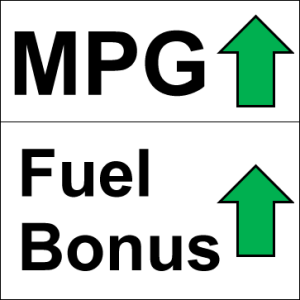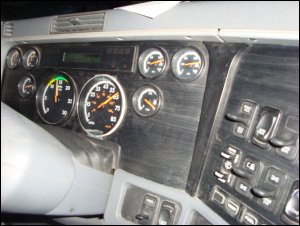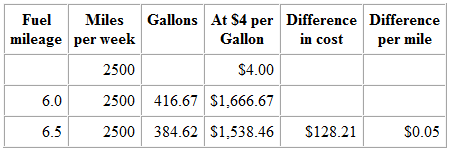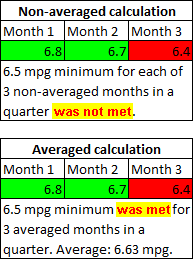Truckers may not hear much about getting a fuel bonus these days, but some trucking companies still offer them.
 When the economy took a plunge, many trucking companies looked for ways to cut back so as not to go out of business altogether.
When the economy took a plunge, many trucking companies looked for ways to cut back so as not to go out of business altogether.
They may have decided to eliminate this bonus.
But the concept of maximizing truck fuel economy is as popular as ever.
On this page, we describe various aspects of this bonus for professional truck drivers.
Issues Regarding Saving Fuel
Before we delve farther, it should be apparent that a fuel bonus is awarded to a qualifying professional truck driver who saves fuel (or gets better fuel economy).
We’ve previously written about tasks that truckers can do to lower unnecessary fuel usage, including:
- Reducing idling;
- Utilizing aerodynamic enhancements to reduce air resistance; and
- Lowering truck speed to a practical level.
Is there a point at which saving fuel becomes a secondary issue?
We say yes.
For a multitude of reasons, we strongly believe that truckers whose trucks are not equipped with APUs should not have to live and work in a hot truck.
What Form Does a Fuel Bonus Come In?
 The last regional trucking company Mike drove for had the technology in place to “see” the data from its truck engines on the inside.
The last regional trucking company Mike drove for had the technology in place to “see” the data from its truck engines on the inside.
This information may be even more comprehensive than what a driver can see on his/her truck’s dash.
The data included everything from the gallons used, the miles driven, the hours idled and more.
We’re confident that the program was able to automatically calculate the effective miles per gallon that each driver achieved in his/her truck.
The bonus may be calculated based on the truck’s fuel economy over a certain period of time.
- For owner-operators, the fuel savings may show up as lower operational costs.
- For company drivers, a fuel bonus may come in monetary form.
We are unaware of any other types of rewards for saving fuel.
If you know of one, please contact us.
How to Get More Cooperation
 In our opinion, any trucking company that is serious about increasing the fuel mileage of its trucks that are driven by company drivers will provide an incentive for achieving goals.
In our opinion, any trucking company that is serious about increasing the fuel mileage of its trucks that are driven by company drivers will provide an incentive for achieving goals.
Such an incentive would be something positive given to a driver (such as a payment), not a punishment for failing to reach a goal (like Gary faced, as we detailed on our anti-idling page).
This would also be something on top of providing an APU to meet the driver’s climate and electrical needs.
Different amounts of money may be awarded for achieving different benchmarks.
Those benchmarks may or may not be achievable depending on the loads you take and the terrain where you must travel.
This could be calculated somewhat like a performance bonus.
One article stated this: “fuel-mileage-performance bonus for high-efficiency operators is delivered in the form of a base pay bonus of up to 4 cents a mile.”
But to get a handle on things, let’s get specific…
Making Calculations
As an example, here are the savings from increasing fuel mileage from 6.0 mpg to 6.5 mpg for a weekly run of 2500 miles:

Here are the savings over a year’s worth of miles (2500 miles per week * 50 weeks per year) and increasing fuel mileage by 1 mile per gallon:

For truckers who live in countries with different currencies or who use different units of fuel, the calculations can be adjusted to meet the need.
Regardless…
It seems reasonable to us that if a trucking company is saving this much money due to a trucker’s efforts, then the trucker should be rewarded with at least part of the savings in the form of a fuel bonus.
How big a percentage of those savings should be awarded may be negotiable.
However, if the company was to split the savings 50/50 — thus giving the driver a substantial incentive to continue saving — both driver and company would come out ahead.
Are These Bonuses Dead in the Trucking Industry?
When Vicki searched online for trucking companies offering a fuel bonus in September 2013, she found quite a number of them.
Unfortunately, she saw no specifics given on how the bonus would be calculated or paid out.
Beware of the “Gotcha”
Some trucking companies require drivers to reach benchmarks over a long period of time in order to get a bonus.
For the sake of argument, let’s assume that a driver has to reach a certain fuel mileage 3 months in a row in order to earn a bonus for saving fuel at the end of a quarter and that the trucking company will not “average” the three together.
What happens if he/she achieves (or even exceeds) the target the first two months, but in the third month is assigned heavy loads in really mountainous areas.
If the fuel mileage slips even a tiny bit under the target that third month, the entire bonus gets kicked out.
“Gotcha, trucker!”
Here’s what we mean based on a target of 6.5 mpg minimum for a quarter:

Lengths of Eligibility Periods
Do trucking companies purposely use long periods of time for fuel-related bonus calculations in order to make it harder for truckers to earn one?
We can’t speak for any specific company.
But it seems that in our electronic age, it wouldn’t cost that much more to calculate a bonus on a monthly basis than a quarterly one.
After all, once the program is set up, the computer does all the work, right?
Unless there is a clear advantage from the truckers’ point of view to computing this bonus on a quarterly basis, it seems as though this bonus should be awarded at least monthly.
What would be a clear advantage to a trucker in this case?
If the rate of pay is larger for a longer period of time, truckers might be persuaded to risk a monthly bonus in exchange for a larger quarterly bonus.
For example, if a driver could get the equivalent of 6 cents per mile for the quarter instead of 4 cents per mile for each of three months, that might interest some truckers.
Consider, however, the boost to truckers’ motivation if they could get rewarded with a fuel bonus each and every month.
It would be a monthly reminder that their work of saving fuel matters.
If you feel strongly about the need for your trucking company to calculate and award these bonuses on a different schedule, talk with your driver manager or even others higher up.
You can also ask other drivers in your company to request the same thing. As Vicki’s mom says, “The squeaky wheel gets the grease.”
Does This Apply Only to Diesel-Powered Trucks?
This subject is definitely applicable to diesel-powered trucks.
But what about trucks that are powered by other forms of energy?
Since we’re addressing a bonus for saving “fuel”, then it will also apply to trucks that run on natural gas and even propane.
How one would achieve higher miles per gallon on an all-electric truck would have to be covered separately.
![]() Money saving tip: Before you hire on with a trucking company offering a fuel bonus, one of the recruiter questions you should ask — and get answered — is how it is calculated.
Money saving tip: Before you hire on with a trucking company offering a fuel bonus, one of the recruiter questions you should ask — and get answered — is how it is calculated.
You might also want to research the company online to find out if it has a habit of withholding earned fuel bonuses from drivers.
The old saying — “A stampede at sunset does not atone for a day misspent” — applies to this subject in that you need to pay attention to (and be consistent about) saving fuel throughout your bonus period.
Once fuel is burned, it can be hard to make up for low miles per gallon later.
Keep your own written records.
We say this in case truckers are driving for unscrupulous companies who should be paying out bonuses but are withholding them from the truckers.
If you know the formula that your trucking company is using to calculate fuel bonuses, then you should be able to calculate what you earn based on your truck’s fuel usage.
If you find you’ve been cheated, be polite but firm about the company’s obligation to pay you.
Return from Fuel Bonus Guide for Professional Truck Drivers to our Employee Benefits page or our Truck Drivers Money Saving Tips home page.






